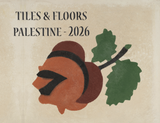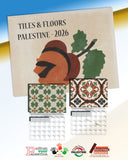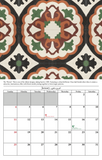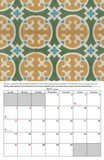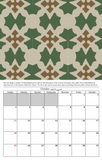Calendar 2026 - Tiles and Floors from Palestine
For this year’s calendar, we turn to one of Palestine’s oldest yet often overlooked arts: the making of tiles. Step into a home, a church, a mosque, or a community hall, and you will find them—tiles like woven carpets of stone. They are astonishing in colour, intricate in pattern, and timeless in their beauty.
The tile making tradition in Palestine goes back centuries. Just like ceramic-making, they are a product of layered history that mixes local clay traditions, medieval Islamic tilework, Anatolian (Iznik) influences brought by Armenian potters, and 20th-century domestic styles. In this calendar, we use patterns that are still being used by the famous Aslan family. We are grateful to the recent work of the Palestinian Museum in order to preserve and protect this important cultural tradition.
The Aslan factory was founded in 1913, initially with branches in Acre, Haifa, Jaffa, and Nablus. After the Nakba of 1948, the other branches were forced to close, while the Nablus workshop survived. Despite the ongoing economic challenges and disruptive effects of 20th and 21st century politics on craft industries, the factory remains steadfast until today. Their craft still involves the traditional methods of moulding with cement and crushed stone, pressing in moulds, hand-painting of design motifs, then curing or finishing. The craftsmen use the traditional tools that have been preserved, decorative motifs and designs that are over 100 years old—geometric, floral and others. Their products are unmatched in its beauty and its quality.
The celebration of the tiles of Nablus is more than an appreciation of a decorative art form—it is a way to affirm the deep ties between Palestinians and their homes. At a time when Palestinians continue to experience displacement, celebrating these tiles becomes an act of remembrance, and a form of cultural resistance—affirming that even when walls fall, the bond to home endures in culture, memory, and beauty. By honouring the tiles, we also celebrate the generations who walked on them, and we re-imagine the stories they told, the joy they celebrated and the hardship they witnessed.
As you mark your days in the coming year, may the gorgeous colours of those tiles remind you of the kindness of Palestinian homes, their warm hospitality and their endless generosity. May this calendar light up the bleakness of the moment, and encourage you to act for a brighter future for Palestine, where you can enjoy visiting graceful homes and walk on such stunning floors—in freedom and dignity.






